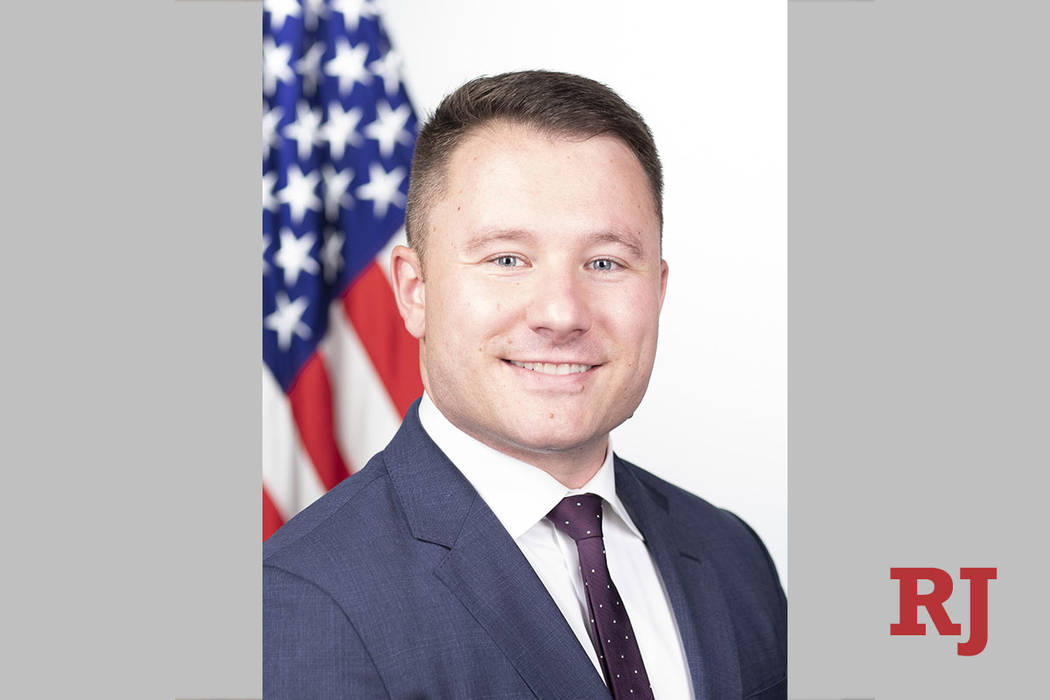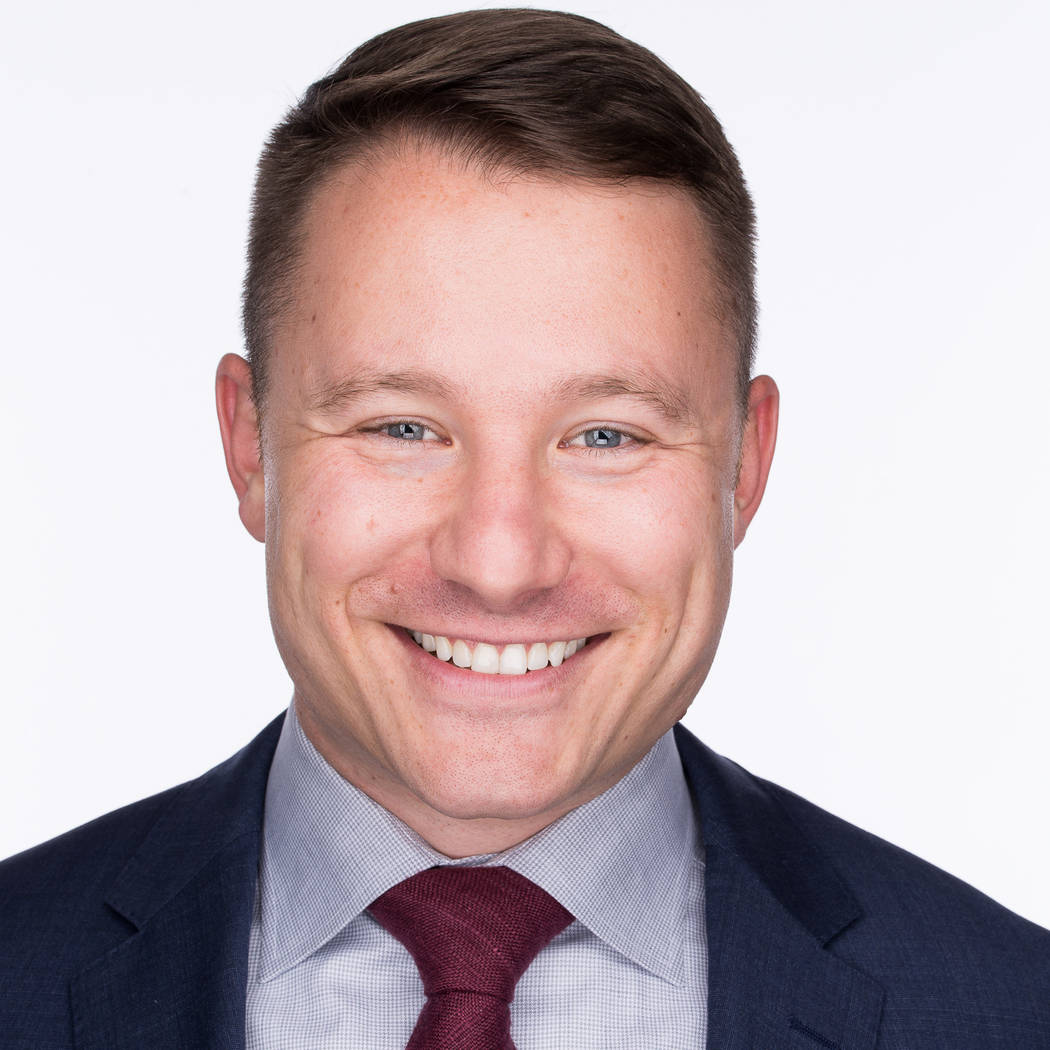A college education led Las Vegas man to the White House
WASHINGTON — Growing up, the only body of water that Las Vegas-born and -raised Alberto Ramos had ever seen was Lake Mead.
So most people probably wouldn’t peg the son of landlocked Nevada — the first member of his family, he believes, to graduate high school — as a likely candidate for the U.S. Naval Academy.
Ramos hadn’t heard of the prestigious military school until 2006, when he was surfing the internet looking for colleges in Boston, and for a reason he’ll never understand, the Annapolis, Maryland, academy popped up.
Ramos looked closer at the naval college and what he saw intrigued him.
“It’s college. You get a uniform. You get a sword. What else do you need?” Ramos recently told the Review-Journal. The academy was the only college to which he applied.
He had no idea what he was getting into. Or that he had begun a path to join an even more exclusive club, that of White House fellows, an elite group of overachievers brought into Washington to learn the ways of power and public service.
The journey also would include a meeting inside the Oval Office with President Donald Trump and other top staff members when he later worked at the Naval Academy.
Conscience of an admiral
Ramos, who has since left the Navy, did not have a speaking role in the meeting, but former Vice Admiral Ted Carter credits Ramos for giving him sage advice when Carter served as superintendent of the Naval Academy and Ramos, by then an Annapolis graduate, was his speechwriter turned right-hand aide.
“He’s highly motivated, driven, smart, funny, personable, somebody you want to have working with you,” Carter said of Ramos, but also “someone you’d want to have at your social hour.”
More important, Carter, the incoming president of the University of Nebraska, confided, “Alberto was my conscience” at a time when “a lot of things that could have gone terribly wrong.”
Ahead of Trump’s commencement speech for the class of 2018, academy political science professor Stephen Wrage wrote a piece in The Washington Post about emails he received from midshipmen who said they would not applaud the president of the United States because they have issues with his character.
Carter feared that the commencement ceremony would turn into a circus. He didn’t want to see an event designed to recognize graduating midshipmen turn into a protest, a campaign rally, or both.
Carter credits Ramos for helping him smooth the waters with Wrage and signal to graduating cadets that if they spoke out of turn, their graduation would be at risk. By failing to graduate, Carter estimated, they could find themselves in debt to Uncle Sam to the tune of $220,000 in tuition.
Both Carter and Wrage, Ramos said later, “realized the students needed to understand what their own professional boundaries were.”
It is a telling statement coming from a young man who grew up in a world with too many barriers that could have barred him from the professional success he has known.
Overcoming barriers
His mother raised three children largely alone. She worked as an elementary school lunch lady, then janitor. Their father left when Alberto was 5, came back years later and then left again.
Ramos, now 31, said he has not spoken to his father since he was 13.
“We were skinny little kids in a trailer park,” recalled Ramos’s sister, Alysia, now a high-school math teacher in Colorado. Her older brother wanted to make sure that was not the way people looked at him.
Younger brother Antonio, an Army veteran now in college, said he sees his sibling as a father figure. “He started working when he was 15. He would get his paycheck. He wouldn’t even open the envelope. He would give it to my mom,” Antonio said.
Alberto credits his mother, Michelle, for putting her children first.
“Every single meal, bar none, we would eat first and we would eat as much as we wanted to within the realms that she cooked and she would eat whatever was left over,” he said.
Michelle pushed for her children to attend magnet schools. Alberto went to Hyde Park Middle School, then the Advanced Technology Academy, or A-TECH. The two hours spent on a bus each day to attend A-TECH were worth it, Ramos said, because graduates generally are expected to go to college.
A life-changing call
To get into Annapolis, Ramos had to find an elected official to recommend him. He went to Las Vegas City Hall, put his name on a list and submitted to interviews with congressional staffers. Then-Sen. John Ensign, R-Nev., supported his application. Ensign even called Ramos at home to tell him he was accepted.
“And I said, you know, do you mind holding for a second? My mom’s right here; do you mind telling her?” Ramos remembered. Ensign kindly complied.
At Annapolis, Ramos studied with others interested in “serving a cause that is greater than themselves.”
At the same time, the Navy took care of him. “They give you all the things you need. They give you luggage. They give you food every day. It was the most I’d ever eaten,” Ramos remembered. With a stipend and his needs met, Ramos saw the Navy as an equalizer.
He also found longtime friends. “The best friends I will ever have were the people that I went through the Naval Academy with,” Ramos said.
After earning a political science degree in Annapolis, Ramos headed straight to the University of Chicago, where he earned a Master of Public Policy degree.
The silent service
Then he went underwater, literally.
Submarines appealed to his “nerdy” side, and the close quarters did not deter him.
“No matter where you are in a submarine, you reach your arm out in any direction just about, there might be a wall between you and them, but there’s somebody within three feet of you almost all the time,” he said.
Ramos liked the mission-driven focus of the work, even though he at times had to go months without emailing his long-term girlfriend, Kennedy, now his wife and mother of their 5-month-old daughter, Rose.
Again, he stood out. Ramos became the youngest sailor appointed to the Naval Submarine League Advisory Council. He was awarded the Military Outstanding Volunteer Medal for his service for underprivileged communities.
In 2018, Ramos was selected as a Next Generation National Security Fellow with the Center for a New American Security. That honor opened the door to a new Las Vegas connection that in turn opened a door to the White House fellow program.
Random meeting
At a center meeting, Ramos met Christina Hernandez, a White House fellow who grew up in Las Vegas and also graduated from A-TECH.
While Ramos and Hernandez didn’t know each other in high school, they had a lot in common. Both were oldest children who became fill-in parents to a younger brother and sister after their fathers left. And both defied low expectations.
Hernandez pushed Ramos to apply to be a White House fellow.
“Las Vegas is such a transient community, but it’s still very, very strong community, and we met each other here in D.C. and had so much in common so quickly between our life stories, back in Vegas to what our careers ended up looking like,” said Ramos.
The simple process of applying is a huge commitment. Ramos estimates he spent in excess of 100 hours on the application process.
Elizabeth Pinkerton, director of the President’s Commission on White House Fellowships, said that her organization looks for high-level achievers from all walks of life — teachers, doctors, troops — who show leadership skills and “a desire to give back to their community.”
The commission tries to “identify people early enough in their career so they can learn how the government works.”
Applicants answer essay questions, which can take days. Hundreds apply.
The standouts appear before regional panels. The final 30 go to a selection weekend, then 11 to 19 are chosen to be fellows.
“We’re trying to get the word out so more people know about it,” Pinkerton noted. (The deadline for the next group of fellows is 5 p.m. Jan. 8.) If you don’t apply, Pinkerton added, you have no chance of getting in.
Learning the ropes
Once they make the cut, future fellows interview with federal agencies. Administrators rank fellows and fellows rank agencies, and a match is found.
Hernandez went to the Office of Personnel Management to work on a Trump executive order to “create a lean, accountable, more efficient government that works for the American people.”
Ramos has a position in what was the Overseas Private Investment Corporation, but has been rebranded as the U.S. International Development Finance Corporation, which partners with the private sector to finance projects in the developing world.
“OPIC was my first choice,” Ramos said. It allows him to tap into his foreign policy and national security background, it’s a small agency and it helps others build bridges.
Pinkerton believes Ramos will succeed and give back to the community.
“I really want to end up back in Nevada,” Ramos confided. Those who know him see Ramos running for office someday.
What are his politics? Ramos was mum on that score in deference, he said, to the nonpartisan nature of the military and the fellows program.
Whatever he does, brother Antonio offered, Ramos will be a father first. Antonio sent a card to his new niece. It said, “You’re my brother’s first-born child, but he’s raised me since I was kid.”
Contact Debra J. Saunders at dsaunders@reviewjournal.com or 202-662-7391. Follow @DebraJSaunders on Twitter.




















